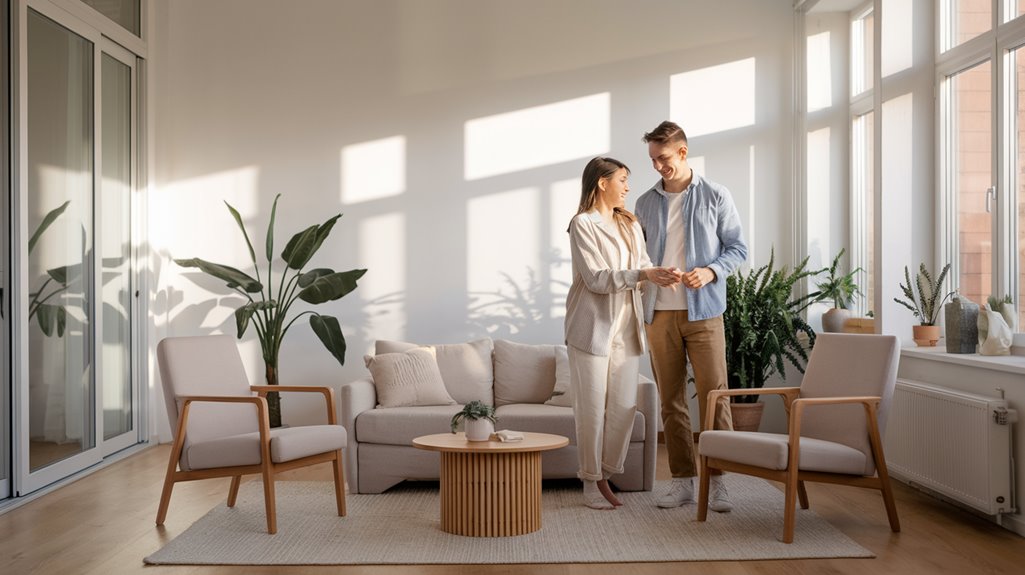When you buy a new home, it's easy to spend too much money. Make a list of what your house costs each month. Take your time with buying furniture and fixing things up. Think about what you really need first. Look for used furniture to save money. Learn how to fix small things around the house. Don't try to buy all the nice things your neighbors have. Save money each month for when things break. Turn off lights and save water to keep your bills low. These good money habits will help you enjoy your home for years to come.
Create a Realistic Home Budget

Your home needs a money plan to keep you from spending too much. First, write down what you pay each month for your house. This means your house payment, power bills, taxes, and fixes.
Some homes also have fees you must pay to live there.
Look at the money you make and what you spend it on. Put some cash away for when things break in your home.
Don't rush to buy new stuff for every room right away. Fix what needs to be fixed first. Save the fun updates for later.
Try using phone apps to track your house costs. These apps help you see if you're spending too much on your home.
Track Your New Monthly Expenses
Your first few months in a new home can be exciting, but you need to watch your money closely. Write down every penny you spend on your home for three months. This will show you what you really need to pay for each month.
Get a money tracking app or make a simple list. Write down:
- Things you buy for your home (like chairs or fixing things)
- Monthly bills (like lights, water, and trash pickup)
- House payments (like insurance and taxes)
Put each cost in the right group. When you track your spending, you can see where your money goes. This helps you plan better and spot money problems early.
Good tracking leads to better choices.
Prioritize Essential Home Improvements
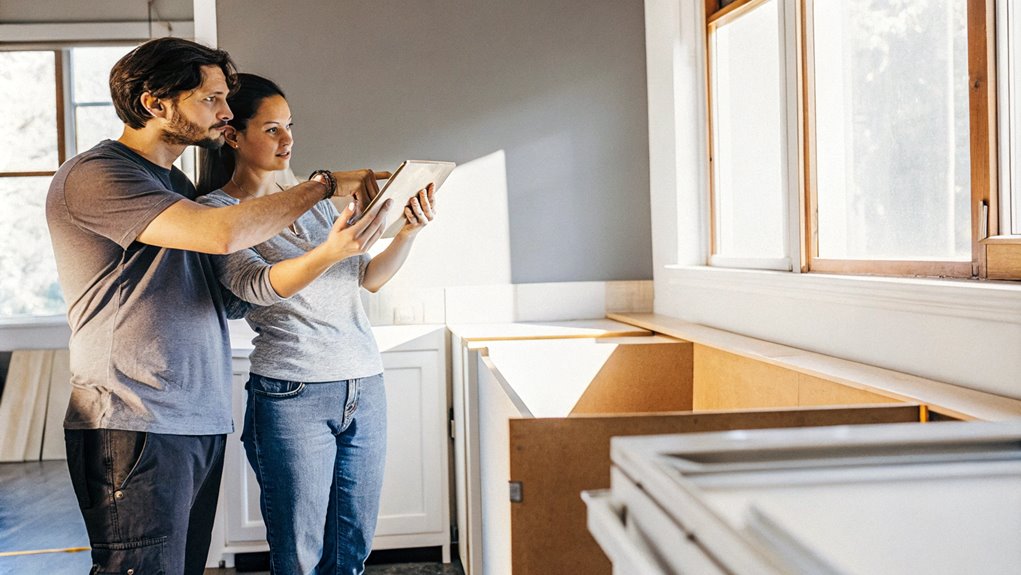
Your home is like a big friend that needs care. Start by fixing the big problems first.
Look at your roof to keep rain out. Check your pipes so water flows right. Make sure your home stands strong from the bottom up. These fixes matter more than making things look pretty.
Plan out when you can fix each problem. Think about how much money you have and what you need to fix first. Save some money for surprise fixes too. Even new homes can break and need help right away.
Keep some money saved just for your home. Think of it like a piggy bank that helps you when things break. This way, you won't worry when something needs to be fixed fast.
Fix Major Issues First
When you buy a new home, you might want to make it look pretty right away.
But fixing big problems needs to come first. This keeps you safe and helps your home stay worth more money.
Fix these big things first:
- Holes in your roof that let water leak in
- Bad wiring that could start fires
- Broken pipes that leak water
Taking care of these problems now will save you money later. Many other people who buy homes face the same issues. It's smart to fix the big stuff first.
Once these fixes are done, you can make your home look nice with fun updates.
Create Realistic Improvement Plans
When you want to make your home better, start small. Think about what you can really do with your money and time.
Make a list of three things:
- Things you must do now
- Things you should do soon
- Things that would be nice to do one day
Write down how much each job will cost and how long it will take. This will help you stay on track.
Don't worry about what you see on TV or online. Those perfect homes take lots of time and money to build.
Work on one thing at a time. Save some money before you start each job. Keep some extra cash for when things break.
Many people take years to fix up their homes, and that's okay. Go at your own speed.
Budget for Emergency Repairs
Your home needs a safety net – money set aside for fixes when things break. Put away 1-3% of what your home is worth each year. Start saving now so you won't need to borrow money later.
Save money for these big fixes that might pop up:
- When your heating or air breaks down ($3,000-$7,500)
- If your roof starts to leak ($500-$5,000)
- When pipes burst or your water heater dies ($1,000-$3,000)
Put this money in its own bank account where you can get to it fast. Don't use this money to make your home look nicer – save it for real problems.
Taking good care of your home helps stop some bad things from happening, but you still need money saved up for when things go wrong.
Shop Second-Hand Furniture First
Want to save money on furniture? Start by looking at estate sales near you. Many people sell their nice furniture for much less than stores do.
Check out used furniture shops too. These shops get nice pieces from people who take good care of their things. Look at a few different shops to find the best deals.
When you buy used items first, you can make your home look great and keep more money in your wallet.
Visit Estate Sales First
When you move into a new home, you might feel like you need to buy new furniture right away. But wait! Try going to estate sales first. You can find amazing deals on great furniture that other families no longer need.
Estate sales are like big house sales where everything must go. The furniture is often better made than new stuff from stores. Plus, you'll spend way less money.
Want to get the good stuff? Here's what to do:
- Get there when the sale starts
- Look for sales in nice areas
- Bring a tape measure to make sure things will fit in your home
Take your time to look at each piece. Check for any damage. And don't be shy – ask for lower prices! The people running the sale expect you to do this.
At estate sales, you can find real wood furniture that will last longer than the new stuff from big stores.
Compare Consignment Shop Prices
When you want to find nice furniture for less money, try going to consignment shops.
These stores sell used items from other people's homes. You can find good furniture that costs much less than new items – often half the price!
Visit a few shops near you. Take pictures of the items you like. Make a list with the prices and sizes of each piece. Ask if they can bring the furniture to your home. This may cost extra.
Many shops get new items each week. They also cut prices on things that don't sell quickly.
Join their email lists to learn about new items and sales. This way, you can find the best deals on furniture you love.
Learn Basic DIY Skills
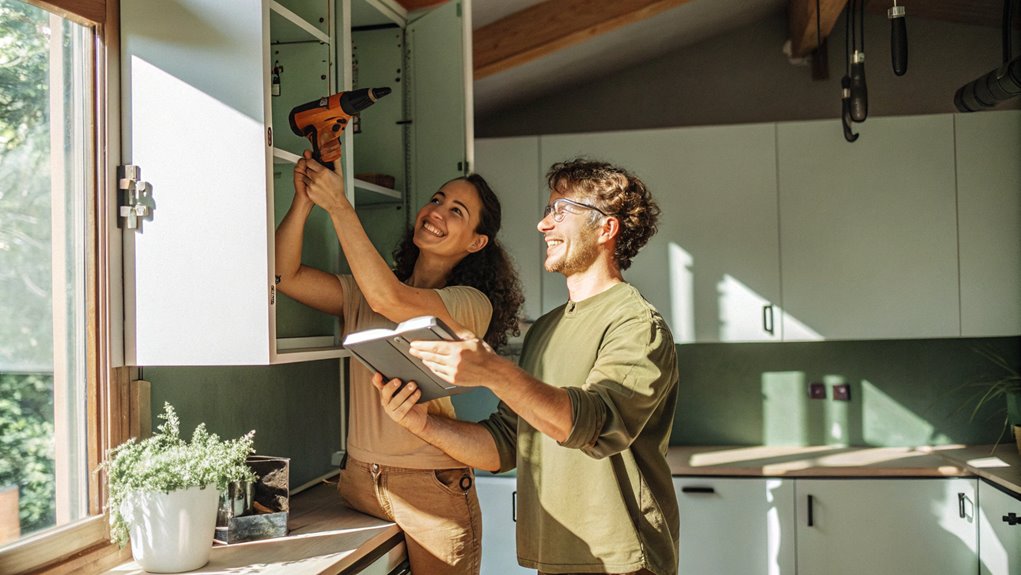
Getting good at fixing things around your home can help you save lots of money. You won't need to call someone to fix every small problem. To start, learn how to use basic tools and make simple fixes.
You can learn by:
- Watching how-to videos
- Taking classes at your local store
- Starting with small, easy jobs
Learn these basic skills first:
- How to fix clogged drains
- How to stop drips in your sink
- How to fix your toilet
- How to put up new lights
- How to patch walls
- How to paint
Make friends with other people who fix their own homes. They can help you learn new things.
Always be safe when you work. If a job feels too hard, ask a pro to help.
Build an Emergency Home Fund
Let's protect your home and peace of mind.
Take time to add up what you spend each month on your home – your house payment, power bills, fixes, and insurance.
Once you know this number, save up enough to cover six months of costs. This money will help if your roof leaks, you lose your job, or life throws you a curve ball.
Make saving easy by having your bank move money from your checking to your savings each time you get paid.
Think of it like paying any other bill – it just goes straight to your safety net.
Calculate Monthly Home Costs
Living in a home costs more than just paying the bank each month.
You need to know all your costs to save enough money for when things break or need fixing.
Your home costs include:
- Monthly payments to the bank
- Property taxes
- Home insurance
- Water and power bills
- Internet costs
- Neighborhood fees
You also need money for basic care of your home.
This means things like cutting the grass, getting rid of bugs, and making sure your air conditioning works well.
Write down what you spend on your house each month.
A simple list will help you see the real costs.
When you know these numbers, you can save the right amount of money and avoid money trouble later.
Set Six-Month Savings Goal
You need money saved up to protect your new home. Think about saving enough to pay for six months of your house bills. This means your house payment, lights, water, and fixes.
Let's break this down into simple steps. If you need $24,000 saved up, try to put away $2,000 each month for a year. Make it easy by having your bank move money to a savings account when you get paid.
Keep taking care of your home while you save. When you get extra money from work or tax time, put it in your savings. Many people like you do this to reach their goal faster.
Automate Emergency Fund Transfers
Let's make saving money easy! Think of your savings like feeding a hungry piggy bank. Each time you get paid, some money will hop from your checking account to a special savings account all by itself.
Pick a savings account that gives you more money back. Keep it at a different bank than your normal one. This makes it harder to grab the money for things you don't really need.
Your savings will help you fix big problems at home like:
- Broken fridges or washing machines
- Leaky pipes or bad wiring
- Heating or cooling that stops working
Start small by saving just 1% of what you make. When that feels easy, save a bit more every three months. Soon you'll have enough saved to feel safe if something breaks at home.
Set up this money move on the same day you get paid. This way, you won't forget or spend it on other stuff. Your future self will thank you!
Resist Keeping Up With Neighbors

Moving to a new home can make you want to copy what your neighbors do. You might feel like you need a perfect lawn or fancy car like they have.
But think about this – your neighbors might be spending money they don't have just to look good.
Don't worry about what others do. Think about what you want to do with your money. Make a plan for how much you can spend on your home each month.
When you feel like buying new things, ask yourself why you got your home. Did you want to save money or show off?
Start with small fixes for your home. Pick the things that mean the most to you.
You can make friends with neighbors by doing free things too. Join a garden group or walk with others in your area. This shows you can be a good neighbor without spending too much money.
Maximize Your Existing Space
Look around your home. You don't need new stuff just because your next-door friends have it. Use what you have in new ways. Move your things around and make each room work better for you.
Try these easy tricks:
- Turn empty spots into comfy places to read or work
- Put shelves on your walls to store more things up high
- Make rooms do double duty – like a desk by day and dining table by night
When you see empty space, you might want to buy new things. Stop! First, try moving your stuff around in new ways.
Clean, neat rooms feel nicer than messy ones full of new things. A tidy home with things in the right spot feels better than a full house with too much stuff.
Take time to fix up what you have before buying more.
Start With Minimal Furnishings

When you move into your new home, keep it simple.
Start with just what you need – a comfy bed to sleep in, a table to eat at, and chairs to sit on.
Look for good used items at yard sales or online to save money.
As time goes by, you can slowly add more things you love to each room.
This way, you won't spend too much or buy things you don't really want.
Buy Used When Possible
When you move into a new home, stores want you to buy new, pricey furniture.
But you don't need to fill your house right away. You can find great used furniture that costs less and still makes your home cozy.
Look for used furniture at:
- Local thrift shops
- Estate sales
- Online selling sites
The best used items to buy are:
- Sturdy wood tables, chairs, and desks you can paint
- Old, unique pieces that stay worth good money
- Big items like dining room sets and bookcases that still look nice
Before you buy, check each piece well.
Feel free to ask for a lower price.
Many people have nice homes filled with used furniture they got for less money.
You can have a pretty home without spending too much.
Focus on Essential Pieces
When you move to a new home, you don't need to fill it up right away. Start with things you use every day. Get a nice bed to sleep in, a table to eat at, and a comfy place to sit. This helps you save money and not buy things you don't need.
Think about what you do each day. You need a good bed to sleep well at night. If you work at home, you need a desk. You need basic things in your kitchen to cook food.
Don't worry about rooms you won't use much, like a guest room. You can get those things later when you have more money saved up.
Furnish Rooms Gradually
Moving into a new home is exciting!
Let's make it cozy one room at a time. This way, you save money and pick things you really love. Live in your home for a bit first. See how you use each room. Then buy what you need.
Start with the rooms you use the most:
- Living room – where family hangs out
- Bedroom – where you sleep and rest
- Kitchen – where you cook and eat
Taking it slow helps you save money for rainy days. It also lets you pick things that make you happy.
Don't worry if your home isn't as full as your neighbor's. Buy what works for you and your family.
Remember:
- Buy one room at a time
- Pick things you really need
- Save money between buying
- Make your home feel like you
Focus on Preventive Maintenance
Your home is like a friend who needs regular care. Just like you visit the doctor for checkups, your home needs checkups too. Make a list of when to check things like your heater, pipes, and roof.
You can learn to fix small things in your home. Watch how-to videos online to learn basic fixes. You can clean gutters and fix dripping faucets on your own.
Talk to other people in your area who own homes. They can share tips and tools with you.
Save some money each month for home care. Put aside a small part of your home's worth every year. This way, you won't face big, costly problems later.
Think of it as a savings account just for your home.
Wait Before Major Renovations
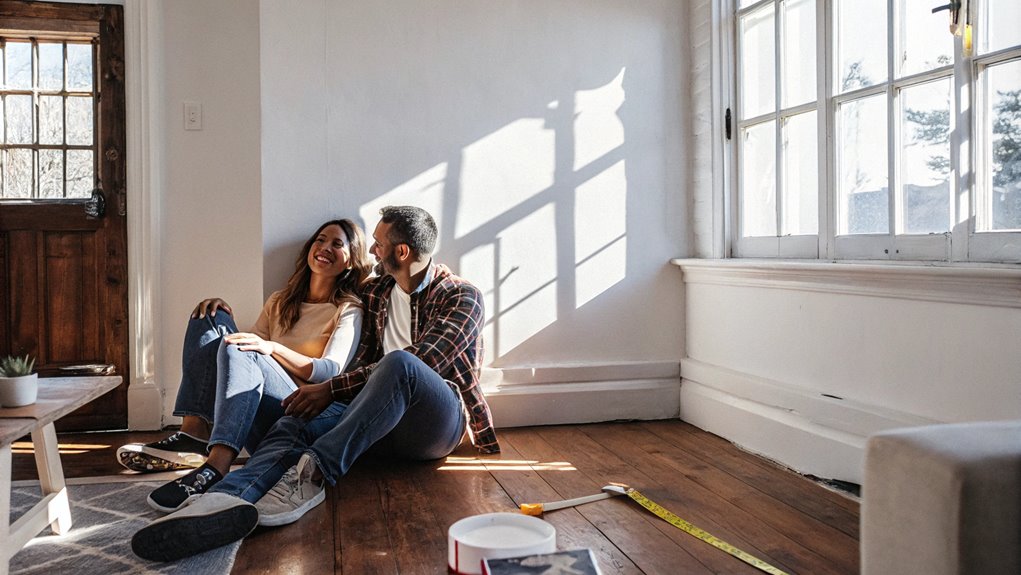
Living in your new home before making big changes is smart. When you first buy a house, you might want to fix everything right away. But slow down! Take time to see how you use your home day by day.
Watch how the sun moves through your rooms. See where you walk the most. Learn which spaces you use a lot or a little. This helps you make better choices about what to change.
Try to wait one year before doing big projects. In that time you can:
- Write down what you want to fix
- Put money aside
- Find good workers
- Pick the best stuff to use
Your first ideas about what to fix might change. After you live in your home, you'll know what really needs work. This way, you spend money on things that make your life better.
Set Clear Spending Boundaries
Your home is like your money jar – you need rules to keep from spending too much. Make a list of what you can buy each month for your home. Split your list into things you must get and things that would be nice to have.
Think about how much money comes into your home each month. Save some of it just for your house needs. Put away a little cash each month in case your home needs a quick fix. Keep this money safe and only use it when you really need to.
Many of your neighbors who stick to their money rules end up saving more. They know when to say no to buying new things that look pretty but aren't needed.
You can do this too by making smart choices about what your home truly needs.
Identify Your True Housing Needs

Your home should feel right for you. You don't need stuff in every room right away. Think about what you need to live well each day.
Look at how you live before you buy things. Ask yourself:
- What do I do in each room every day?
- What do I need right now to feel at home?
- What can wait until later?
Empty rooms are OK. They give you time to think about what you really want.
When you wait and think first, you save money. Your home will work better for you too.
Avoid Impulse Home Purchases
Your new home is exciting! But don't rush to buy lots of stuff right away. Many people spend too much money when they first move in. They buy things they don't really need.
Make a list of what you must have in the first three months. These are things like a bed to sleep in and a table to eat at. For other items, wait at least 30 days. Living in your home will show you what you really need.
While you wait, you can look for good deals. Check stores for sales. Look at used items too. Your home doesn't need everything right away. Take your time to pick things you love.
Master Energy-Efficient Living
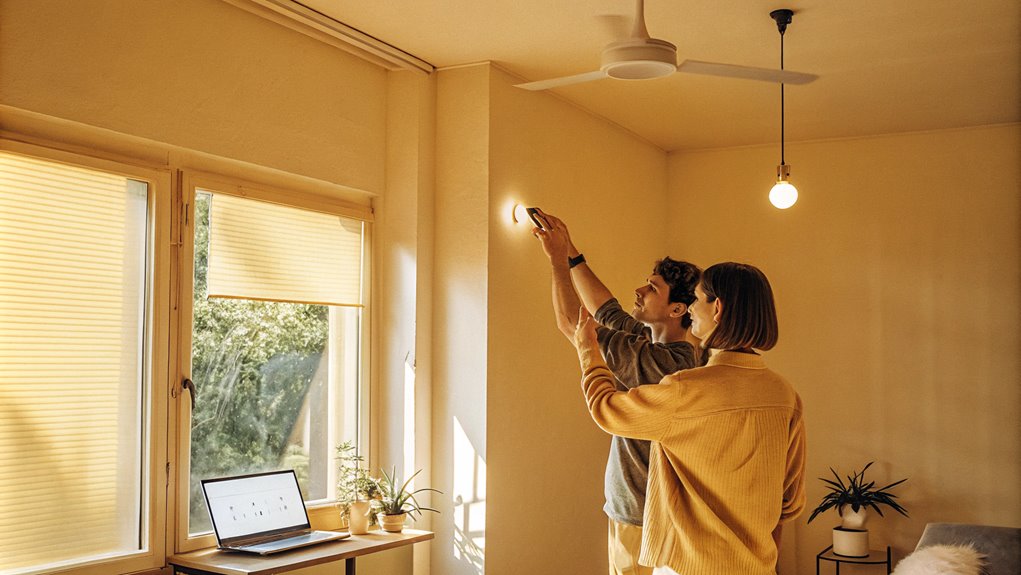
Your home can help you save money when you use less energy. Take a look around your home to find places where energy is being wasted. You can start saving money right away when you fix these spots.
Try these easy fixes:
- Get a smart switch for your home heating and cooling. It will change the room temperature when you sleep or go out.
- Use LED lights – they save lots of power and money.
- Put strips around doors and windows to keep warm or cool air inside.
Small things you do each day help too. Turn off the lights when you leave a room. Wash clothes in cold water when you can. Keep your heating and cooling systems clean.
These easy steps will save you money and help the Earth too.

